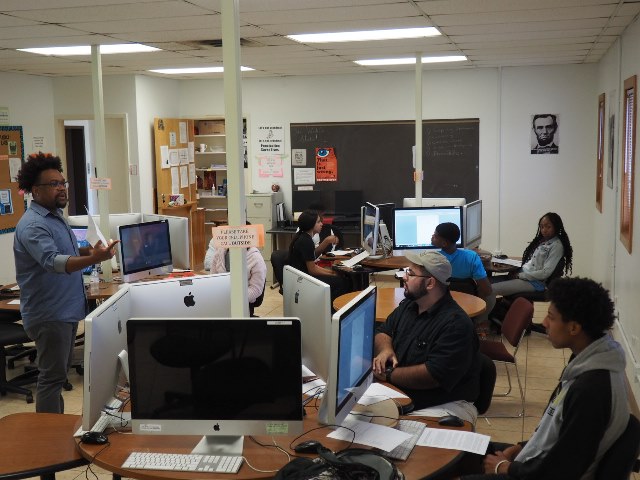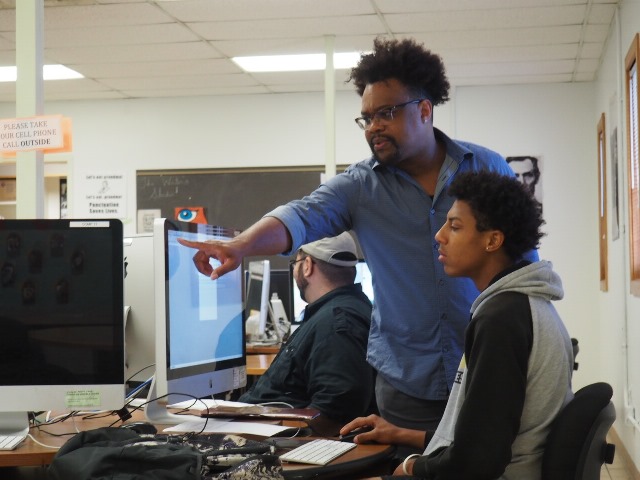AUSTIN — Enough of the high national rates of college graduates underemployed; HT, right here in Austin, wants to help decrease that rate through its RAM Career Connections’ Career Pathways Initiative (CPI). HT’s vision is for students to become intentionally connected to a world that exists outside of the University and to become meaningful change agents. Through CPI, an initiative that is in its second year and made possible by a one million dollar ($1,000,000) United Negro College Fund (UNCF) grant in 2016, the world connection is happening.
Through CPI, HT sets a cohort of first-year students on a pathway to rewarding careers that match their majors. Thanks to the UNCF, HT can carry out its vision of a connected world through executing its planned intervention to increase “job matching.” Job matching is securing a career that matches a graduate’s college major.
This year’s summer cohort includes the maximum number of 30 students, an increase of eight students from the prior year. The total number by the Fall 2018 semester will jump to 120. The number reflects HT’s desire to affect as many students as possible and keep expenses low for them; besides cost for classes, participants do not have to pay for anything else such as room and board, meals, activities, or books because of the UNCF grant. HT hopes to increase the number of participants as funding allows in years to come.
The pathway for freshmen students starts the summer before the first fall semester of their college years and continues to graduation. The pathway ends when graduates secure the jobs that match their majors.
The summer includes students first choosing a career in which they want to work. The pathway continues with two courses, English and public speaking, with mastery leading to college credit. Mixed with the summer courses are educational trips. One upcoming trip includes a visit to Houston to watch a Shakespeare in the Park production of “The Comedy of Errors.” But first, students must journey through a dining etiquette experience sponsored by HT’s dining services. This experience prepares students to dine in a formal restaurant following the Shakespeare show. Next, to prepare for the trip, students must read “The Comedy Errors” and interpret the play with modern artistry such as through spoken word or song.
As if the summer is not full of opportunity for our CPI students, another big opportunity lands in their laps. Students are required to complete a business plan for a startup company that will address the challenges of real, local businesses. These businesses partner with the University to provide the challenges and mentoring along the way. Then, the biggest opportunity may come the following summer when some of those local businesses offer students an internship.
An internship or studying abroad is the goal for students’ second summer in the program.
Along the pathway, other experiences exist such as learning the Austin transportation system. Students will receive a bus pass with the challenge of taking different buses as groups and having the same destination.
“This way, they are self-sufficient in the fall; you will know how to use the Metro, get on the bus or train, and do what you need to do,” Dr. Rhonda Moses said. Dr. Moses serves as HT’s dean of enrollment management and leads CPI along with her division’s default preventionist and financial literacy counselor Ambrose Price.
In a University-wide effort, faculty responds to the mission of the CPI by adjusting the respective curriculum to match the eight core competencies for the involved industries.
Dean Moses explained.
“We work with business partners to say, ‘So for the learning outcomes, your learning outcome should be critical thinking. It should be this and so on,’ so we adjust the class curriculum to match the core competencies. So far, the faculty has adjusted freshman and sophomore classes’ curricula. Next up, by the time the cohorts reach their junior and senior years, the adjusted curricula will match their selected industries.
“So every step of the way at HT, all of the classes are aligned with the industries’ needs for students to be successful in that career,” Dean Moses said.
Even though disciplines align with industries, CPI expands students thinking by showing how multiple disciplines relate. For example, if the discipline is criminal justice, there is a discussion on how that discipline relates to communication or business administration.
“This way, when they graduate from HT, they are not just focused on one avenue in their major but on multiple ways in which they can use their degree,” Dean Moses added. She went on to provide another example.
“For instance, if they don’t want to go into criminal justice, then the business administration field may lead them into the business law field.”
To put into perspective HT’s effort to decrease the national deficit with job matching, a 2013 study spoke to the national challenge.
The study, done by a set of New York Fed economists and posted on the Federal Reserve Bank of New York’s website (https:/libertystreeteconomics.newyorkfed.org/2013/05/do-big-cities-help-college-graduates-find-better-jobs.html) and later cited by The Washington Post (https://www.washingtonpost.com/news/wonk/wp/2013/05/20/only-27-percent-of-college-grads-have-a-job-related-to-their-major/?utm_term=.ee46030ce956), found that only 27 percent of college graduates have a job that matches their major. One important factor found in the study for lack of job matching is “where” graduates look for a job. More specifically, the study found that bigger cities with more opportunities tend to help graduates find a career in their major. Austin is a bigger city, but many students do not remain in Austin following graduation; they move off to even bigger cities.
In addition to city size, other factors include having the soft skills (attitude, communication, creative thinking, work ethic, teamwork, networking, decision making, positivity, time management, motivation, flexibility, problem-solving, critical thinking, and conflict resolution) and internships to enhance a college graduate’s resume and marketability.
With all of the factors above facing graduates nationwide, HT wants to make sure its graduates do not fall in the job “mismatching” cycle.
Dean Moses shared her excitement about the collaboration across HT to make CPI successful.
“What I’m excited about is the University effort; it really is a collaborative effort. Faculty, academic affairs, student affairs, enrollment management, all working together, just to make sure we take all disciplines across campus and achieve a 100-percent conversion to the CPI model.”
HT thanks its many partners with the CPI program. The partners include the City of Austin, the Austin American-Statesman, Prosperity Bank, Gay and Lesbian Chamber of Commerce, Hispanic Chamber of Commerce, Austin Chamber of Commerce, HomeAway, Headliners Foundation, KUT Radio, UT School of Journalism, KEYE-TV, KXAN-TV, Texas Advanced Computing Center, Additive Robotics, UT/Apptronik Systems, Google Fiber, IBM Graphic Design, DELL, Harmony School of Excellence, East Austin College Prep, Rodeo Austin, and CHWC.
CPI would not be possible without UNCF. HT is a member institution of UNCF. UNCF’s mission is to build a robust and nationally-recognized pipeline of under-represented students who, because of UNCF support, become highly-qualified college graduates and to ensure that our network of member institutions is a respected model of best practice in moving students to and through college.
Read more about UNCF’s Career Pathways Initiative here: https://uncf.org/cpi.
###









